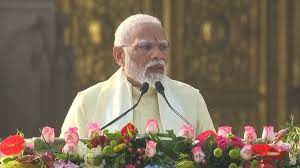

By Sunil Garodia
First publised on 2024-01-23 13:51:14
Two remarkable things happened during and after the consecration ceremony in Ayodhya on January 22. In the first, 15 couples from all over India, representing a cross-section of society and including couples from Dalits, tribals and OBCs, were made 'yajamans' and performed the pran pratistha in tandem with Prime Minister Modi and other dignitaries. The only difference was that they were not in the garbha griha for lack of space and security reasons and a mahant guided them with the rituals outside. This was a commendable decision and ensured that people representing their communities and regions made it a truly inclusive affair where marginalized communities were made part of the momentous occasion. RSS leader and trustee of the Shri Ram Janmabhoomi Teerth Kshetra Trust, Anil Mishra, and his wife were the 'pradhan yajaman' and performed all rituals leading to the main pran pratistha.
In the second remarkable thing, none of those who addressed the special invitees chose to use the greeting 'Jai Shri Ram'. The opposition leaders, especially Mamata Banerjee, have time and again said that the BJP has weaponized the greeting 'Jai Shri Ram' and has made it a political slogan that no longer held any religious meaning when uttered by BJP leaders and workers. Perhaps keeping this in mind and to retain the sanctity of the occasion, Prime Minister Modi chose to greet with 'Siyavar Ramchandra ki Jai' while the firebrand UP chief minister Yogi Adityanath used 'Sri Ram Lalla Bhagwan ki Jai', 'Bharat Mata Ki Jai'and 'Jai Jai Sita Ram'. The assembled sadhus also did not chant 'Jai Sri Ram' and thankfully, BJP workers were not allowed entry. It was commendable display of restraint by both the leaders and it would help in deflecting opposition charges that the BJP had politicized the event. Apart from this, the tone and tenor of the speeches by Prime Minister Modi, Yogi Adityanath and RSS chief Mohan Bhagwat was not aggressive or overtly political and they were delivered keeping in mind the sanctity of the occasion.











